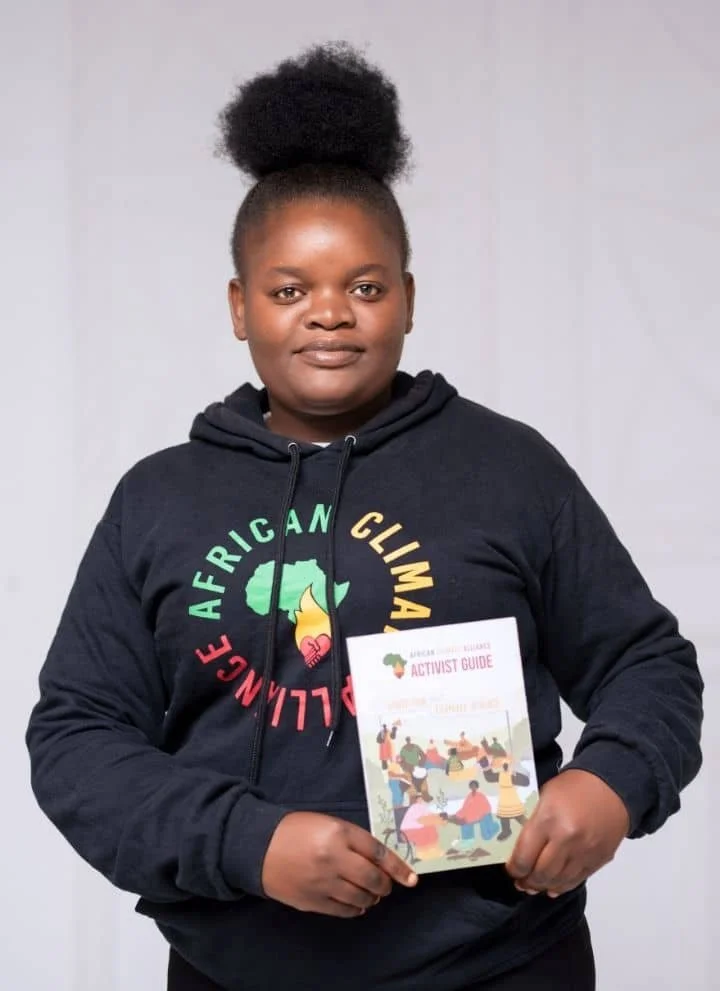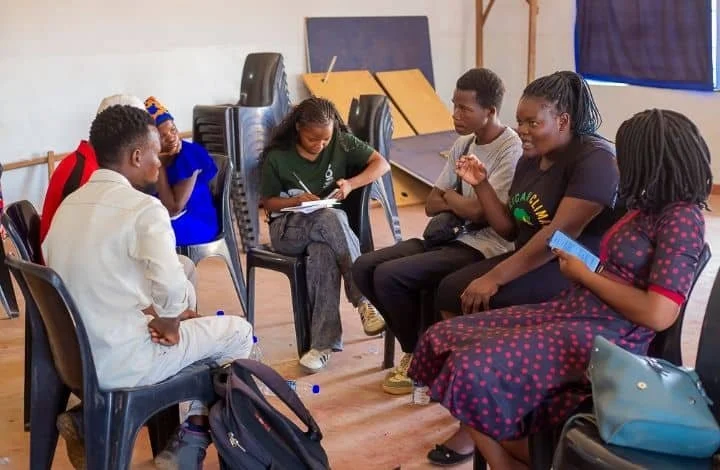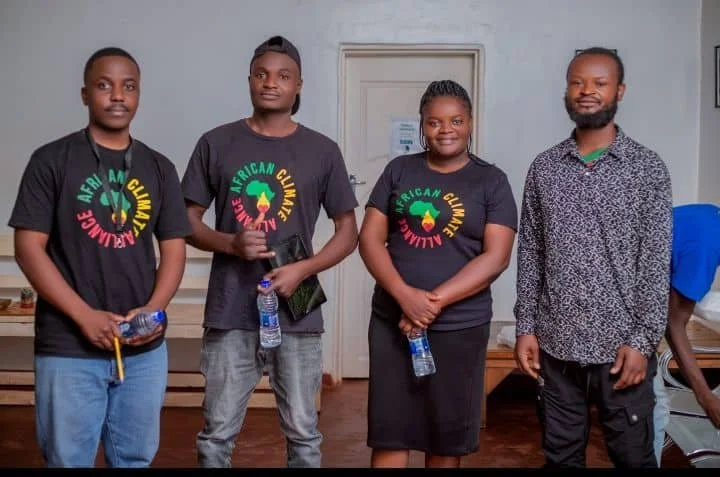Activist Spotlight: Shupikai Ritta Nema on Gender Justice and Climate Action in Malawi
An interview with Shupikai Ritta Nema, a Malawian African Climate Alliance Ambassador who is advocating for gender justice and inclusive climate solutions in her community.
Shupikai Ritta Nema is a young climate activist from Zomba, Malawi, and one of the African Climate Alliance Ambassadors leading local climate action across the continent. Her activism began in 2022 while studying at the University of Malawi, where she started questioning her own impact on the environment and seeking ways to become, in her words, a “genuine earthkeeper.” Since then, Shupikai has grown into a passionate advocate for gender justice, indigenous knowledge, and youth empowerment.
In September, as part of our month of community-led climate action – featuring Cape Town Climate Week, Johannesburg Climate Week, and 8 community-based initiatives led by youth across the continent – Shupikai, and several other Malawian ACA Ambassadors, co-hosted an event in Zomba that brought together young people and community leaders to explore the links between gender justice, sustainable food systems, and sexual and reproductive health in a changing climate.
We interviewed Shupikai as part of our Activist Spotlight series to learn more about her journey and her African Climate Alliance Climate Week event.
Below are some of the highlights including:
How climate change is affecting her community in Zomba,
How the climate crisis affects sexual and reproductive health,
And why climate solutions must include all marginalised groups.
What inspired you to join the African Climate Alliance?
I joined the African Climate Alliance to learn more skills and gain knowledge about environmental advocacy so that I could become a genuine earthkeeper. I knew that as I continued fighting for change in the environmental space, ACA would equip me with the tools and experience to strengthen my advocacy journey.
What does climate justice mean to you personally and in your community’s context?
Climate change is affecting Malawians in many ways. For example, it destroys people’s property. Cyclone Freddy had long-lasting negative impacts. It destroyed people’s houses and farmland.
In Zomba, we have a small lake called Lake Chirwa. People used to grow rice near the lake, but much of that area is now covered with water. Heavy rains expanded the lake, and people lost land that once helped them earn an income through farming. Others lost their homes and were forced to relocate.
To me, climate justice means helping people who are most affected by climate change — listening to their voices and making decisions that truly support them.
Can you tell us about your Climate Week action?
Together with my fellow ACA Ambassadors from the southern region of Malawi, we organised a Climate Week event based on the theme: “Building a Resilient Generation: Indigenous Knowledge, Gender Justice, Sustainable Food Consumption, and Sexual and Reproductive Health and Rights in a Changing Environment.”
We wanted to share practical ways to address climate justice in a changing world, while reminding one another that the fight against climate injustice and climate change requires collective effort.
We partnered with the Greengen Initiative and Mbedza Projects, and we invited young eco-warriors from the Songani area in Zomba to take part.
Your event focused on the Climate Week theme of gender justice. Why is this so important to you?
During our Climate Week event, I focused on gender justice because in Malawi, there is poor representation of women in the environmental space, even though women are among those most affected by climate issues.
I wanted to remind my fellow eco-warriors that if we truly want effective solutions for everyone, gender cannot be left out. Gender justice is not only about empowering women, but also about helping men understand that we must all fight against climate injustice, regardless of our gender.
What are the connections between sexual and reproductive health and the climate crisis that you think more people need to be aware of?
The climate crisis affects sexual and reproductive health in many ways. For example, people struggle to access health services during extreme weather events.
When Malawi was hit by Cyclone Freddy, some roads were not passable. Pregnant women couldn’t reach hospitals for medical help, and some sadly lost their babies. Some hospitals were also destroyed, meaning patients had to walk long distances to reach unaffected facilities.
Based on your event, what did you learn about how indigenous knowledge systems can inform climate solutions?
From the Climate Week event, I learned that as we take climate action, we must also apply indigenous knowledge. The way climate change affects us now is very different from the past, which means our parents had good practices that helped them cope with environmental changes.
For example, they used to plant indigenous trees that served multiple purposes — providing medicine and improving soil fertility. These practices show that traditional knowledge can still guide us toward sustainable solutions today.
Was there a moment during your action that stood out to you — something that made you feel proud, surprised, or hopeful?
One moment that made me feel hopeful was when a participant said, “If we keep addressing climate issues without taking serious action, then we will be dancing to the same music.”
I felt so proud to see that young eco-warriors understand that their actions matter most in the climate space.
What was your biggest takeaway from the day?
My biggest takeaway was that as we work to end climate injustice, we must always look for solutions that include all marginalised groups, because they are often the most affected — for example, women and people with disabilities.
What message would you share with other young people who want to take climate action in their own communities?
My message to young people is that taking climate action is a big deal! Start small — like planting trees — and don’t forget to join forces with your friends and family to make it impactful. Every action counts, and together we can make a difference.
What was the African Climate Alliance's month of climate action?
This year in September, across 19 events and 6 countries, we connected the dots between climate change and our many social crises. We showed that the climate crisis is not just about changing weather patterns, but it’s a human rights crisis that amplifies existing inequalities. It touches our lives when it comes to how we access food, water, energy, housing, transport, and impacts gender inequity.
Simply put: for the first time, September was our month of climate action.
We hosted the fourth Annual Cape Town Climate Week, the first-ever Johannesburg Climate Week, and for the first time, eight of our African Climate Alliance Ambassadors — young climate leaders who have been through our year-long mentorship programme — hosted their own Climate Week actions in Zimbabwe, Kenya, Malawi, Zambia, Nigeria, and South Africa.
All of the events brought together activists, community leaders, students, and citizens to learn about the connections between climate change and social injustices and showcase community-led solutions proving that climate justice must include food, water, energy, spatial, and gender justice at its core.
Expanding what started as Cape Town Climate Week across the continent showed us that climate justice doesn’t belong in one place, but can be built everywhere by young people leading in their own communities.
Learn more about Cape Town Climate Week and Johannesburg Climate Week.



